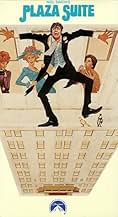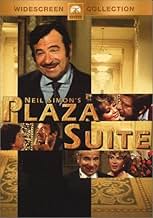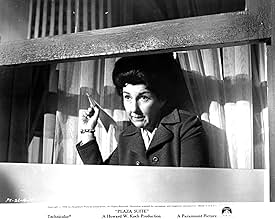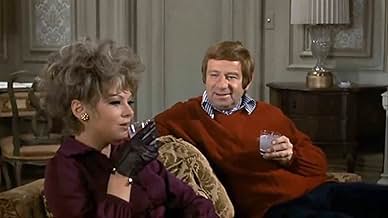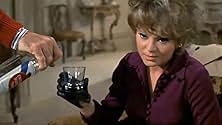Three vignettes, each set in room 719 of New York's Plaza Hotel, make up this comedy.Three vignettes, each set in room 719 of New York's Plaza Hotel, make up this comedy.Three vignettes, each set in room 719 of New York's Plaza Hotel, make up this comedy.
- Awards
- 2 nominations total
José Ocasio
- Room Service Waiter
- (as Jose Ocasio)
Frank Albanese
- Parking Lot Attendant
- (uncredited)
Raina Barrett
- Girl in Lobby
- (uncredited)
Jack Beers
- Man in Hotel
- (uncredited)
James Bryson
- Doorman
- (uncredited)
Jordan Charney
- Jesse's Aide
- (uncredited)
Gordon B. Clarke
- Hotel Manager
- (uncredited)
Alan DeWitt
- Man in Lobby
- (uncredited)
- Director
- Writer
- All cast & crew
- Production, box office & more at IMDbPro
6.53K
1
2
3
4
5
6
7
8
9
10
Featured reviews
Dialogue heaven...
The old cliche applies to this brilliantly acted and wonderfully scripted film; they don't make them like this any more. The comedy, the intensity, the emotion is all in the dialogue and in the performances of the leading ladies and of course, that of Walter Matthau as the three lead male characters.
The dialogue crackles from start to finish. I don't think a script like this would ever get the green light in Hollywood today. Too much talk, not enough drama, nothing that really happens. In many ways it's more like a French film.
Walter Matthau is from that wonderful generation of fifties and sixties comic actors who could be over-the-top without overracting (Peter Sellers, Phil Silvers, Tony Hancock etc.). He manages to do this whilst never losing his grip on his characters and always managing to surprise with his subtle facial expressions and the comic timing of his movement.
Great performances and a great film.
The dialogue crackles from start to finish. I don't think a script like this would ever get the green light in Hollywood today. Too much talk, not enough drama, nothing that really happens. In many ways it's more like a French film.
Walter Matthau is from that wonderful generation of fifties and sixties comic actors who could be over-the-top without overracting (Peter Sellers, Phil Silvers, Tony Hancock etc.). He manages to do this whilst never losing his grip on his characters and always managing to surprise with his subtle facial expressions and the comic timing of his movement.
Great performances and a great film.
Hit play comes to the screen without flair or style...and with a first act that leaves a sour tone for the rest of the picture
Neil Simon's Broadway success, brought to the screen in a dung-colored transfer. Walter Matthau plays three different men who check into suite 719 at the Plaza Hotel in New York City at different times. In the opener, he's a neglectful husband to needy, chatty Maureen Stapleton; in the second, he's a movie producer from Hollywood who phones up old flame Barbara Harris for a tryst; and for the finale, Matthau is married to Lee Grant and suffering the wedding catastrophe blues after his daughter gets cold feet before her ceremony. Simon, despite having penned the adaptation himself, was reportedly not happy with the picture; George C. Scott and Maureen Stapleton had played all the central parts on stage, though Simon felt Matthau's take on the three male characters didn't work on film. He was partly right (Matthau is most ill-at-ease in the second episode), but the main problem with the film is the first installment. Portraying a long-suffering married couple on the brink of imploding, Matthau and Stapleton are busily beleaguered and convincingly antagonistic...it might have helped if they were funnier. Matthau's incarnation of the callous (and cheating) hubby is, unfortunately, so unfeeling towards his spouse--in a story which is not satisfactorily resolved--that it leaves a sour residue from which the rest of "Plaza Suite" never recovers. Some of the flip talk is cheeky and amusing, Lee Grant gets some colorful bits of business, but this is still a depressing experience. The Plaza Hotel must have been infuriated with the art direction: this picture makes the posh resort look like a Burger King. ** from ****
not very funny
Not very funny or interesting. All three of the skits are pretty boring. I could hardly keep myself awake during the second one, I only watched the third one because i heard it was the best of the three, It was just as bad as the first two. Walter Matthau is a fine actor but not in here.
Plaza Suite
Matthau scores in all three vignettes from Neil Simon's long running triumph about different people who stay at a particular room in the posh New York hotel. His three ladies Stapelton, Harris and Grant are also wonderful. This is among the best of Simon's works to be adapted for the screen.
Peeping Neil
I swear, Neil Simon was window peeping on my life. At least, in the 1st vignette. I had that conversation, and I had/have that memory. Amazing. Simon is a master. I saw this the 1st at a much younger age and couldn't relate but I can now. I haven't been the wedding character yet, but it's coming. I've met the guy in vignette #2, but I'm smarter and left his dumba$$ at the bar.
Did you know
- TriviaThis film's screenwriter and source playwright Neil Simon once said of this movie: "I didn't like the cast. I didn't like the picture. I would only have used Walter in the last sequence and probably Lee Grant. I think Walter Matthau was wrong to play all three parts. That's a trick Peter Sellers can do. I have to accept some of the blame for the film. I kept all the action in one room. It was rather confining. We could have gone into other suites. I didn't think it out, but I learned from that."
- GoofsIn Act 3, Norma Hubley's hat gets soaking wet when she sticks her head out of the window. In the next shot it is dry again.
- Quotes
Norma Hubley: Promise me you won't get hysterical.
Roy Hubley: Why? What'd you do?
Norma Hubley: Just promise me.
Roy Hubley: Alright, I promise. what'd you do?
Norma Hubley: I broke my diamond ring.
Roy Hubley: Your good diamond ring?
Norma Hubley: How many do I have?
- ConnectionsFeatured in Paramount Presents (1974)
- SoundtracksTangerine
Written by Johnny Mercer and Victor Schertzinger
- How long is Plaza Suite?Powered by Alexa
Details
Box office
- Gross US & Canada
- $1,669,403
- Runtime
- 1h 54m(114 min)
- Sound mix
- Aspect ratio
- 1.85 : 1
Contribute to this page
Suggest an edit or add missing content




